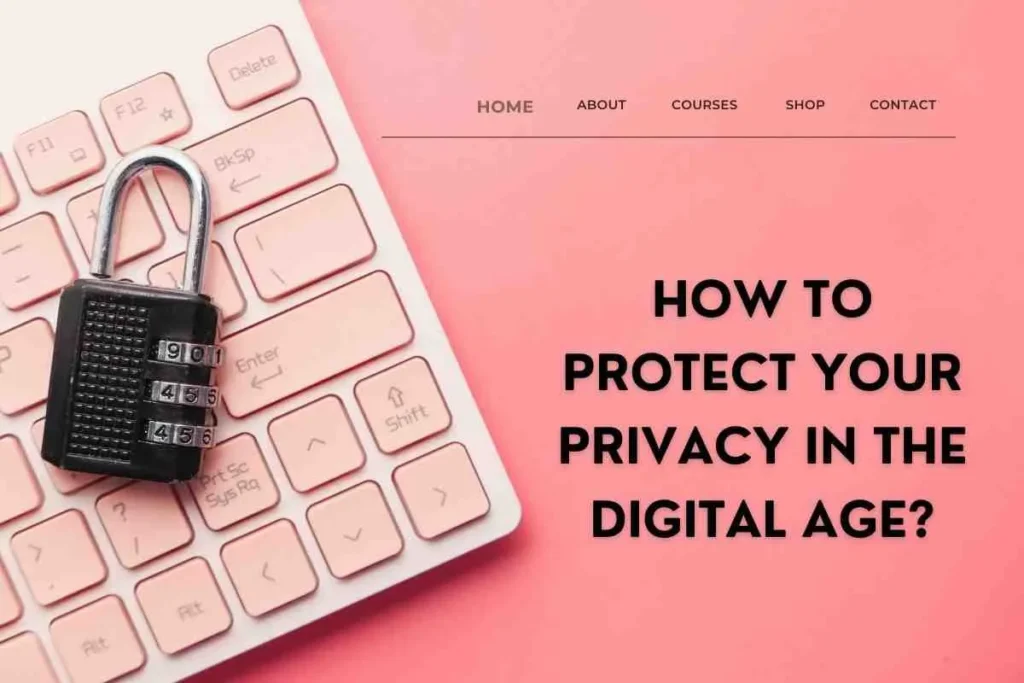Learn how to protect your privacy in the digital age with these practical tips and strategies. From using strong passwords to enabling 2FA to being mindful of social media privacy settings, this blog post covers everything you need to know to safeguard your personal information.

How to protect your privacy in the digital age?
In today’s digital age, where technology is deeply integrated into our lives, protecting our privacy has become more crucial than ever. With the increasing prevalence of data breaches, online surveillance, and invasive tracking practices, it is essential to take proactive steps to safeguard our personal information. This blog post aims to provide you with practical tips and strategies to protect your privacy in the digital realm.
Strengthen Your Passwords:
One of the simplest yet most effective ways to protect your privacy is by using strong, unique passwords for all your online accounts. Avoid using easily guessable passwords like “123456” or “password.” Instead, create complex passwords that include a combination of uppercase and lowercase letters, numbers, and special characters. Additionally, consider using a password manager to securely store and generate unique passwords for each account.
Enable Two-Factor Authentication (2FA):
Enable two-factor authentication whenever possible. This adds an extra layer of security by requiring a second form of verification, such as a unique code sent to your mobile device, in addition to your password. 2FA significantly reduces the risk of unauthorized access to your accounts, even if your password is compromised.
Be Mindful of Social Media Privacy Settings:
Review and adjust your social media privacy settings to control who can see your posts, photos, and personal information. Limit the visibility of your profile to trusted friends and family, and be cautious about accepting friend requests from unknown individuals. Regularly review and update your privacy settings as social media platforms often introduce new features and settings.
Use Encryption and Secure Communication Channels:
When transmitting sensitive information online, ensure that you are using secure communication channels. Look for websites that use HTTPS (Hypertext Transfer Protocol Secure) encryption, indicated by a padlock icon in the browser’s address bar. For sensitive conversations, consider using end-to-end encrypted messaging apps like Signal or WhatsApp, which protect your messages from interception.
Regularly Update Your Software:
Keep your operating system, web browsers, and applications up to date with the latest security patches. Software updates often include bug fixes and security enhancements that protect against known vulnerabilities. Enable automatic updates whenever possible to ensure you are always running the latest, most secure versions.
Be Cautious of Phishing Attempts:
Phishing is a common method used by cybercriminals to trick individuals into revealing sensitive information. Be cautious of unsolicited emails, messages, or phone calls asking for personal information or login credentials. Avoid clicking on suspicious links and verify the legitimacy of the sender before sharing any sensitive data.
Minimize Data Sharing:
Be mindful of the information you share online. Avoid providing unnecessary personal details on social media platforms, and carefully consider the privacy policies of websites and apps before sharing your data. Regularly review and adjust the privacy settings of your online accounts to limit the amount of information accessible to third parties.
Use Virtual Private Networks (VPNs):
Consider using a reputable Virtual Private Network (VPN) service when connecting to public Wi-Fi networks or when you want to browse the internet anonymously. A VPN encrypts your internet traffic and masks your IP address, providing an additional layer of privacy and security.
Conclusion:
Protecting your privacy in the digital age requires a proactive approach and a combination of best practices. By implementing the tips mentioned in this blog post, you can significantly enhance your online privacy and reduce the risk of falling victim to privacy breaches and cyber threats. Stay vigilant, stay informed, and take control of your digital footprint to safeguard your personal information.
